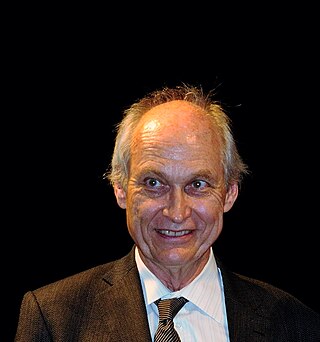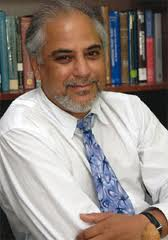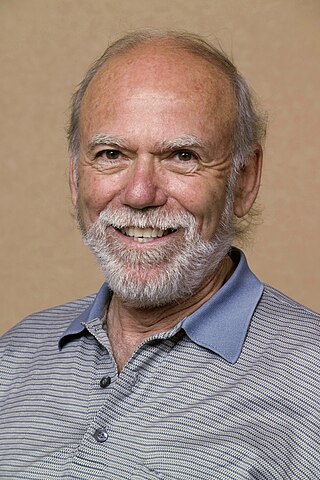
Nicolaas Bloembergen was a Dutch-American physicist and Nobel laureate, recognized for his work in developing driving principles behind nonlinear optics for laser spectroscopy. During his career, he was a professor at Harvard University and later at the University of Arizona and at Leiden University in 1973.

Eleanor Margaret Burbidge, FRS (née Peachey; 12 August 1919 – 5 April 2020) was a British-American observational astronomer and astrophysicist. In the 1950s, she was one of the founders of stellar nucleosynthesis and was first author of the influential B2FH paper. During the 1960s and 1970s she worked on galaxy rotation curves and quasars, discovering the most distant astronomical object then known. In the 1980s and 1990s she helped develop and utilise the Faint Object Spectrograph on the Hubble Space Telescope. Burbidge was also well known for her work opposing discrimination against women in astronomy.

David Jonathan Gross is an American theoretical physicist and string theorist. Along with Frank Wilczek and David Politzer, he was awarded the 2004 Nobel Prize in Physics for their discovery of asymptotic freedom. Gross is the Chancellor's Chair Professor of Theoretical Physics at the Kavli Institute for Theoretical Physics (KITP) of the University of California, Santa Barbara (UCSB), and was formerly the KITP director and holder of their Frederick W. Gluck Chair in Theoretical Physics. He is also a faculty member in the UCSB Physics Department and is affiliated with the Institute for Quantum Studies at Chapman University in California. He is a foreign member of the Chinese Academy of Sciences.

Michael S. Turner is an American theoretical cosmologist who coined the term dark energy in 1998. He is the Rauner Distinguished Service Professor Emeritus of Physics at the University of Chicago, having previously served as the Bruce V. & Diana M. Rauner Distinguished Service Professor, and as the assistant director for Mathematical and Physical Sciences for the US National Science Foundation.

Armand Paul Alivisatos is a Greek-American etymologist, chemist and academic administrator who has served as the 14th president of the University of Chicago since September 2021. He is a pioneer in nanomaterials development and an authority on the fabrication of nanocrystals and their use in biomedical and renewable energy applications. He was ranked fifth among the world's top 100 chemists for the period 2000–2010 in the list released by Thomson Reuters.

David James Thouless was a British condensed-matter physicist. He was awarded the 1990 Wolf Prize and a laureate of the 2016 Nobel Prize for physics along with F. Duncan M. Haldane and J. Michael Kosterlitz for theoretical discoveries of topological phase transitions and topological phases of matter.

Steven Chu is an American physicist and former government official. He is a Nobel laureate and was the 12th U.S. secretary of energy. He is currently the William R. Kenan Jr. Professor of Physics and Professor of Molecular and Cellular Physiology at Stanford University. He is known for his research at the University of California, Berkeley, and his research at Bell Laboratories and Stanford University regarding the cooling and trapping of atoms with laser light, for which he shared the 1997 Nobel Prize in Physics with Claude Cohen-Tannoudji and William Daniel Phillips.
Margaret Mary Murnane NAS AAA&S is an Irish physicist, who served as a distinguished professor of Physics at the University of Colorado Boulder, having moved there in 1999, with past positions at the University of Michigan and Washington State University. She is currently Director of the STROBE NSF Science and Technology Center and is among the foremost active researchers in laser science and technology.

Swapan Chattopadhyay CorrFRSE is an Indian American physicist. Chattopadhyay completed his PhD from the University of California (Berkeley) in 1982.

Michael Lawrence KleinNAS is Laura H. Carnell Professor of Science and director of the Institute for Computational Molecular Science in the college of science and technology at Temple University in Philadelphia, US. He was previously the Hepburn Professor of Physical Science in the Center for Molecular Modeling at the University of Pennsylvania.

Cherry A. Murray is an American academic who is professor of physics and the director of the Biosphere2 Institute at the University of Arizona at Tucson. She is the Benjamin Peirce Professor of Technology and Public Policy emerita at, and former dean of, the Harvard School of Engineering and Applied Sciences (SEAS).
Wick C. Haxton is an American theoretical nuclear physicist and astrophysicist. He is a professor of physics at the University of California, Berkeley and senior faculty scientist at Lawrence Berkeley National Laboratory. He was appointed a co-editor of the journal Annual Review of Nuclear and Particle Science as of 2023. In 2024, he was elected to the American Philosophical Society.

Barry Clark Barish is an American experimental physicist and Nobel Laureate. He is a Linde Professor of Physics, emeritus at California Institute of Technology and a leading expert on gravitational waves.
Edward Allan Frieman was an American physicist who worked on plasma physics and nuclear fusion. He was the director of the Scripps Institution of Oceanography from 1986 through 1996, and then the senior vice president of science and technology at the Science Applications International Corporation from 1996 on until his death in 2013.

Philip H. Bucksbaum is an American atomic physicist, the Marguerite Blake Wilbur Professor in Natural Science in the Departments of Physics, Applied Physics, and Photon Science at Stanford University and the SLAC National Accelerator Laboratory. He also directs the Stanford PULSE Institute.

Homer Alfred Neal was an American particle physicist and a distinguished professor at the University of Michigan. Neal was president of the American Physical Society in 2016. He was also a board member of Ford Motor Company, a council member of the National Museum of African American History and Culture, and a director of the Richard Lounsbery Foundation. Neal was the interim President of the University of Michigan in 1996. Neal's research group works as part of the ATLAS experiment hosted at CERN in Geneva.

Andrew Marienhoff Sessler was an American physicist, academic, former director of the Lawrence Berkeley National Laboratory (1973–1980), humanitarian and former president (1998) of the American Physical Society.
Ramamoorthy Ramesh is an American materials scientist of Indian descent who has contributed to the synthesis, assembly and understanding of complex functional oxides. In particular, he has worked on the fundamental science and technology translation of ferroelectric perovskites, manganites with colossal magnetoresistance, and multiferroic oxides with potential benefits for modern information technologies. To date, Ramesh has >675 publications with >100,000 citations, resulting in an h-index >150. He was named Citation Laureate for his research on multiferroics (2014).

Jun Ye is a Chinese-American physicist at JILA, National Institute of Standards and Technology, and the University of Colorado Boulder, working primarily in the field of atomic, molecular, and optical physics.
Chennupati Jagadish, an Indian-Australian physicist and academic, is the President of the Australian Academy of Science, and a Distinguished Professor of Physics at the Australian National University Research School of Physics. He is head of the Semiconductor Optoelectronics and Nanotechnology Group which he established in 1990. He is also the Convener of the Australian Nanotechnology Network and Director of Australian National Fabrication Facility ACT Node.















